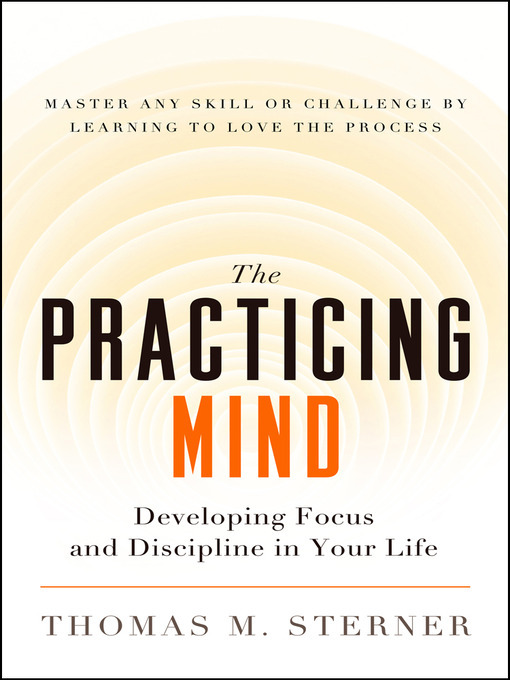
Note: The winners for this giveaway have already been chosen. Subscribe to Tiny Buddha for free daily or weekly emails and to learn about future giveaways!
The Winners:
Have you ever feared you’ll never excel at a skill or reach a goal you set? Have you ever judged yourself or your efforts as “not good enough,” creating a sense of paralysis? Or how about this: Have you ever felt so eager to excel that the process became stressful and unsatisfying?
In his book The Practicing Mind: Developing Focus and Discipline in Your Life, Thomas M. Sterner explores how to “master any skill or challenge by learning to love the process,” as the cover reads.
Sterner has mastered quite a few challenges; he’s a concert piano technician, an accomplished musician, a pilot, and a golfer—and he’s learned how to practice each skill with a focus on the present.
Sharing personal anecdotes, insights, and lessons, Sterner teaches us how to simplify and concentrate on the task at hand; break goals into smaller, more manageable steps; and slow down so that we can give our full attention to each step along the way.
I highly recommend The Practicing Mind to anyone who wants to find more joy in the process of working toward their goals, and in doing so increase their effectiveness.
The Giveaway
To enter to win 1 of 2 free copies of The Practicing Mind:
- Leave a comment below
- Tweet: RT @tinybuddha Book GIVEAWAY & Interview: The Practicing Mind http://bit.ly/R5EnKh
If you don’t have a Twitter account, you can still enter by completing the first step. You can enter until midnight PST on Sunday, August 12th.
The Interview
1. What inspired you to write The Practicing Mind?
I was always learning new skills growing up. However, my creative mind was very unbridled and so it didn’t want to stay with any one endeavor for very long. I was undisciplined and lacked perseverance.
Perhaps what saved me was that even at a young age, I was aware that I was stuck in this pattern of behavior that made me feel disempowered in regards to my own destiny. In my late teens, I set out to better understand why I operated in a manner that was not serving me well and to figure out how to change it.
That first led me into an extensive study of eastern thought and meditation, starting in college, and later into western studies of peak performance and modern sports psychology. The culmination of what I learned and how it transformed me led to the book.
2. In Chapter 1, you wrote that our culture is built on multitasking. Do you think it’s possible to multitask without sacrificing mindfulness? And if so, how?
I need to expand on the word multitasking. Yes, our culture is built on this concept because we are constantly trying to increase productivity. However, multitasking, as we think of it, does not exist. We really don’t do multiple things at the same time at the level of our brain.
What we do is more accurately described as “switch tasking” because our brain must stop each process it is currently working on before starting a new one. It is very linear in nature. This happens so quickly that it feels as if we are doing multiple things at once but in reality we are not.
This constant stopping and starting not only costs us enormous amounts of energy over time, it causes our energy to be very scattered instead of being focused. Ironically, when we are more mindful and present in our activity, we are operating more in harmony with how our brains naturally function.
So I would have to say that trying to multitask interrupts a more natural state of mindfulness.
3. In Chapter 2, you explored our instincts to focus on the fruits of our labor, as opposed to the process itself. How can we let go of outcomes and still work toward specific goals?
I don’t know if it is really our instinct to focus on our goals. I think we are taught this unhealthy mindset by our culture and the modern marketing media. Ideas like, “When you get a certain automobile, when you can afford a certain life style, when you look a particular way, then you will feel happy” are programmed into us constantly.
There is much profit to be made when those feelings exists within us. Along with that programming comes the feeling that we cannot be happy without those things. We are taught to be very attached to our goals. This mindset creates and reminds us that there is a void between where we are and where we want to be.
We must go through a process to reach any goal, but our perception and experience of that process is flexible and within our control.
I enjoy sailing, and most sailors would say, “When you have left the marina you have reached your destination.” This is because with sailing the joy is in the journey to the destination. You trim the sails for the most efficient use of the wind and in each moment the destination you have chosen moves towards you.
That process and that journey can feel effortless and joyful as you watch the sun sparkle on the water and feel the wind and sun caress your face, or you can check your watch every five minutes and curse the boat for not moving faster. The fifty miles between you and your destination remains the same with either perspective.
Your destination serves to steer your efforts, and that is enough. When you focus on the distance between you and the destination, your experience of the journey becomes one of impatience and struggle. You waste energy that could be going into observing and trimming the sails for maximum speed.
So it’s the understanding of this truth that gives us what we need to let go of our goals and to experience them flowing toward us without a sense of struggle and anxiety.
4. Later in the book, you talk about the pursuit of perfection and how it impacts our happiness. Can you speak to this a little?
This very much relates to the question on being attached to the goal. I think we all experience a sense of incompleteness at times. That experience feels like, “I am not happy and I need to get to some other place where I will be. Then this feeling will go away.”
To me, this feeling is born from a false sense of perfection and our need to achieve it—the perfect job, the perfect relationship and so on. These all refer to a static place in time and space that we can get to with a certain amount of effort.
In reality, true perfection is none of these. By nature it must be ever expanding and evolving. For the musician, for example, perfection is not the ability to play a particular complicated piece of music, even if it were possible to define it as the most difficult piece ever written.
That would mean that once the musician mastered that piece, they were done growing. They would never evolve technically or grow any deeper in their relationship with music.
True perfection is infinite in its ability to expand, which means that you don’t reach it, but instead you are there right now, simply by being in your own process of growing. This infinite nature is a gift, not a punishment.
When you can let go of the “when I get to here, things will be perfect” feeling and realize that you are already there, you give yourself the opportunity to experience perfection in every moment through your awareness of your own growth.
5. One of the main themes of The Practicing Mind is awareness. Why is self-awareness so challenging?
For me, self-awareness is being separate from our thoughts, not functioning within our thoughts. It is the realization that we are not our thoughts but the one who has the thoughts.
When I ask people to sit quietly with their eyes closed and stop thinking, most cannot. For many, this is the first time they realize that their mind produces thoughts even when their will is commanding it not to.
When we are not aware of this, our mind leads us around on a leash all day firing off thoughts for each circumstance we visit. We are then the puppets of the emotions these thoughts elicit. This is what I mean by being in your thoughts instead being the observer of your thoughts.
Awareness of this difference is most empowering because it gives you the privilege of conscious choice.
6. What’s one simple thing we can do every day to develop discipline and focus?
That’s easy—meditation. None of what I am talking about here is possible without self-awareness, and that awareness comes naturally through practicing stillness.
It’s important to remember that when you meditate, it’s the instant that you catch your mind producing thoughts without your permission and you reel it back into silence, or to your breath, that your awareness strengthens and expands. Each time you re-center your mind, you grow. No effort is lost.
Understand that if you approach developing discipline and focus as a skill that will make you happy only after you achieve a certain level of it, then you are falling back into the trap of perfection.
Your awareness of your goal and your moment-by-moment effort toward it is enough. You have already reached your destination.
Learn more about The Practicing Mind on Amazon.
FTC Disclosure: I receive complimentary books for reviews and interviews on tinybuddha.com, but I am not compensated for writing or obligated to write anything specific. I am an Amazon affiliate, meaning I earn a percentage of all books purchased through the links I provide on this site.
About Lori Deschene
Lori Deschene is the founder of Tiny Buddha. She started the site after struggling with depression, bulimia, c-PTSD, and toxic shame so she could recycle her former pain into something useful and inspire others to do the same. You can find her books, including Tiny Buddha’s Gratitude Journal and Tiny Buddha’s Worry Journal, here and learn more about her eCourse, Recreate Your Life Story, if you’re ready to transform your life and become the person you want to be.
- Web |
- More Posts













 Though I run this site, it is not mine. It's ours. It's not about me. It's about us. Your stories and your wisdom are just as meaningful as mine.
Though I run this site, it is not mine. It's ours. It's not about me. It's about us. Your stories and your wisdom are just as meaningful as mine.
I’d love to win this book 😀 I picked up learning French and yoga for the x-th time in my life, and even though I’m committed to practice I often feel like giving up again – which leaves me with a nasty feeling. I therefore could certainly use Sterner’s advice and insights. Thanks for the chance to win xo
I would really appreciate this book for both myself and those I hold dear to read. I am at a place where I have practiced a little meditation but find i don’t commit reagularly enough to it, yet know I would benefit from it. The other areas covered in the book really appeal to me also especially the perfectionism thoughts. I was raised in a religion (which I am no longer part of) where being perfect is thrust into your mind daily. Thanks for the chance : )
This is a great opportunity you are providing for growth. I know I could benefit from Sterner’s work, and I already know the first three people I would have read it after me. Best of luck to all on this giveaway, and thanks, Lori.
Thank you for the opportunity, Lori. I would love to learn more about practicing self-awareness and apply it to my life right now, with taking care of my baby, taking care of my career, and my moment-by-moment efforts. Good luck to all those who enter the giveaway.
I could totally use this book! Maybe help me get my stuff together! 🙂 Thank you.
As someone who studies Sports Psychology and who is also a competitive athlete, this book would be a great read for me and my clients.
I have just completed a month long course in meditation and want to continue the discipline I have begun. I know that meditation is getting heart and mind together and I have always relied on my mind. I am sure this book will help me use the qualities of my mind to open my heart.
A very interesting interview which lead me to want to read this book! I will probably end up buying it through Amazon regardless, but winning it would be wonderful! Thanks for the opportunity!
I am just getting started in meditating, and am finding its many benefits. This sounds like an excellent book to continue my education on paying attention “in the moment”. Ingrid Huebner
I definitely need to read this book. I’m having that same pattern showing up – I’m working on discipline I guess
This sounds like a great book!
I would love to read this book. 🙂
I am enough, I can always be more. I find being still, mindful comes naturally when I am gardening, sewing, washing the dishes, folding the laundry, brushing the dogs or the donkeys; a single task at hand calms me and I am peaceful. More than one thing going on and I find my heart-rate increasing, my thoughts racing, I am no longer present in the moment. Balancing life with real life is a continual process of progress not perfection.
Thank you for the offer of the book. I know I can benefit greatly from it. In the interview I can see How this books addresses the things I am actively working on. I truely am working on being present in the moment.
Thank you
Thanks for your work!
“If we take eternity to mean … timelessness, then eternal life belongs to those who live in the present. Our life has no end.” — Ludwig Wittgenstein
Words to live by.
I felt better just by practicing mindfulness and breathing while reading this article!
next book on my list to read, still catching up on the daily readings, thanks, had so much depression, just nice being outta the dark!!!!
I would love this book! I feel like my heart is in the right place of learning to be happy with the wonderful life I have, but my mind constantly wanders and loses focus on the now. I would love to learn more on how to develop the discipline in my life!
Meditation does help calm the mind and focuses it too and is a practice that I would highly recommend to anyone wishing to better themselves. its not a magic panacea to all of lifes ills but will go a great way to give peace of maind to many. So does the practice of mindfullness. Trying to achieve ` perfection` is a surefire way to distress and unhappiness. Forget perfection. wanting to learn new skills is a great way to enjoy life at any age and to make one feel better and grow older and wiser slowly. If Mr Mercer can show how to do this via focusing better etc then its definitely worth reading this book. as I have not read it yet I cannot comment on the book itself, but hopefully will be able to read it and instil the advice into my own life and that of others.
Having just come back from a Vipassana, I can now say from an experiential (rather than intellectual) viewpoint, how profound and important the practice of meditation and mindfulness is. Not only does attention to our life and our environment make us calmer, and more balanced – it also helps us to relieve and let go of the miseries that we create for ourselves. It allows us to accept the impermanence of life, which gives us to a deep sense of calm and equanimity. It also helps us to connect to our love for self, and importantly, our love and desire for the good will of others. Making time for meditation each day may seem like a difficult task, but it is also possibly the most important decision you could make.
As someone who struggles with self-discipline and mindfulness, I would love a copy of this book to help me with my perfectionism.
Meditation is very important to the mind and the body and I proved it today when I went in for my pre admission for my birth. They took my blood pressure and it was a bit high at 159 but then I asked them to give me a min and I slowed my body down and it was 119. That was quite the difference.
Timing of this is spot on … meditation practice is becoming a part of my life and really seeing the benefits of it.
I’d really love this book as I need to learn to concentrate on a goal that’s very important to me and that now I finf out to achieve, maybe because I have to break it into smaller, more manageable steps first.Good luck everybody 🙂
I need this book or I will go insane!!!
This is where I’m at right now. I’ve fallen behind on my health (mind, body and soul) that I certainly could learn from this book and use some self discipline. Thank you for sharing!
I would like the book giveaway
Would love a copy of this book. Meditation has done wonders for me.
I would love to share this with my clients who struggle with anxiety and mild depression as a result of perfectionistic traits.
Would like to get hold of the book to help me and guide through a hard passage of time I am going through.
I really enjoyed a peek inside the book and a glimpse into the author.
At 34 I feel I’m going through some life changes and having a difficult time processing and trying to bring more peace and happiness into my life.
I hope to read this book fully one day soon.
I am entering a new chapter in my life. Refreshing the mind with this sound guidance sounds right. Count me in!
I’m living in an environment where I feel like I’m condemned for being slow and doing one thing at a time. I really liked the response to the multi-tasking question – that it’s really switch tasking. It explains why when trying to do too many things, I feel so drained, and at the same time, like I’ve accomplished less than the energy I spent on it!
If luck is when preparation meets opportunity, I hope this is my opportunity… I just added this book to my wish list on Amazon and then saw your giveaway post on Facebook!!!
If luck is when preparation meets opportunity, this must be my opportunity…. I just added this book to my Amazon wish list and then saw your giveaway post on Facebook!!!
I would “LOVE” to add this book “The Practicing Mind” by Thomas M Sterner to my library collection. Meditation has been a life changing practice for me and will forever be a part of my daily living. Thanks for all your simple wisdom Tiny Buddha!!!!!!!!
Can’t wait to get my hands on this book. It’s just what I need… Right here… Right now.
Good book and interview. Would love this.
I’m hoping to learn more about Buddhism and mindfulness is definitely something that I need more practice in!
This book looks great. I would love to read it.
I need a book like this to further help me in relaxing myself in a more natural way. It also just looks like a really good read.
My family often said I’ll do much much better if I know how to Focus well on my goal, and to develop the sense knowing what comes as Priority and what’s not. I would love a copy of this book to teach me the practice of Focus and self discipline. Thank you.
I would like to read the whole chapter where he talks about multi-tasking. As a former 9-1-1 Operator/Dispatcher, I have to say multi-tasking is a must have skill. I hope when he is talking about switch-tasking he is talking more an a macro scale.
this is really interesting to think about. the topic of multitasking and still trying to maintain mindfulness in the modern world is a real problem that people face every day.
This book looks like just the thing I need right now!
Meditation & discipline are challenges for me. Reading the interview inspires me to give it another go.
Through Meditation i get in touch with my inner. I can see myself in a mirror. To obtain my Buddhahood. Thanks for all the inspirations. Josie
I am a classical musician and am very interested in Mr. Sterner’s thoughts. I am constantly pushing myself to be a better musician, but I find that that pushing often doesn’t serve the music well. A major issue in my daily life is to have the right mindset: driving and disciplined but also mindful and calm. They don’t often go together, and this is a struggle for me!
I am a classical musician and am very interested in Mr. Sterner’s thoughts. I am constantly pushing myself to be a better musician, but I find that that pushing often doesn’t serve the music well. A major issue in my daily life is to have the right mindset: driving and disciplined but also mindful and calm. They don’t often go together, and this is a struggle for me!
sorry, didn’t mean to post twice…can’t figure out how to delete it.